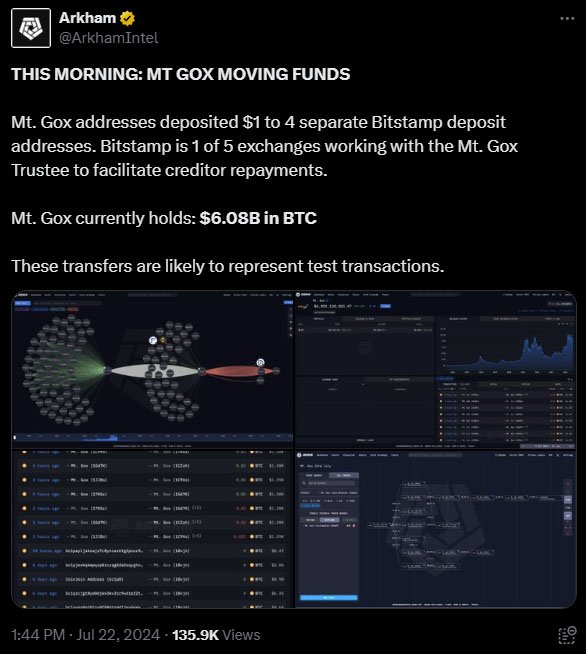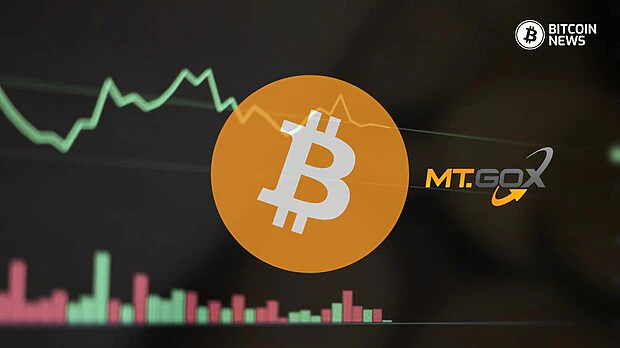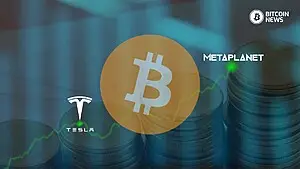Mt. Gox, once the world’s largest Bitcoin exchange, has been a name synonymous with both the rise and tribulations of the Bitcoin market. In the recent months, news of Mt. Gox bitcoin transfers have shaken the market.
Founded in 2010, Mt. Gox handled approximately 70% of all Bitcoin transactions globally. Originally created as a platform for trading “Magic: The Gathering” cards, it quickly became a pivotal player in the burgeoning Bitcoin world.
However, in 2014, the exchange experienced a catastrophic security breach, losing around 850,000 bitcoin, worth hundreds of millions of dollars at the time. This event led to its bankruptcy and triggered years of legal proceedings and rehabilitation efforts to compensate its creditors.
In recent weeks, Mt. Gox has been making headlines again with significant bitcoin transfers as part of its ongoing efforts to repay creditors.
The latest series of transactions, which began in mid-July 2024, involves moving billions of dollars worth of bitcoin to new addresses and exchanges. These actions are part of a $9 billion repayment plan to compensate approximately 127,000 creditors who have been waiting for over a decade.
On July 23, 2024, Mt. Gox made another series of substantial bitcoin transfers.
According to Arkham Intelligence, a wallet linked to Mt. Gox moved over 47,500 bitcoin, valued at nearly $3.2 billion, to two new addresses. The first transfer involved 42,587 bitcoin, worth around $2.82 billion, and the second saw 5,110 bitcoin moved to a cold storage address.

“Mt. Gox moved a total of $2.85B BTC to new wallets this morning in order to distribute 5110 BTC ($340.1M) BTC to four separate Bitstamp addresses,” Arkham Intelligence reported.
These transactions are part of the broader repayment strategy, which includes distributing bitcoin and Bitcoin Cash to creditors through designated exchanges like Bitstamp, Kraken, Bitbank, and SBI VC Trade.
The massive movement of bitcoin has had a noticeable impact on the market. On the day of the transfers, bitcoin’s price dipped below $66,000, reflecting a 1.84% drop from earlier levels.
This decline is partly attributed to the market’s reaction to the large transfers and the anticipation of further sales by creditors who receive their repayments.
Despite this dip, bitcoin has shown resilience.
Analysts from various exchanges, including Bitfinex, have noted that large investors seem to be buying the dip, moving their funds to cold storage wallets, which indicates long-term holding strategies rather than immediate selling.
The repayment process by Mt. Gox is a significant event in the Bitcoin world.
It marks the culmination of years of legal and financial efforts to compensate those who lost their investments in the 2014 collapse. Bitstamp, one of the primary exchanges involved in the distribution, confirmed that it plans to begin distributing the funds as soon as possible.
Kraken, another exchange involved, has already confirmed receiving funds from the Mt. Gox trustee and is preparing to distribute them to creditors, stating:
“We have successfully received creditor funds (BTC and BCH) from the Mt. Gox Trustee.”
The anticipation of these repayments has generated mixed feelings in the market.
While some fear that the influx of bitcoin into the market could lead to selling pressure and further price declines, others see it as a necessary step towards resolving one of the longest-standing issues in the Bitcoin world.
Analysts from Bitfinex noted:
“Given the uncertainty brought upon by an unclear Democrat candidate, we can expect a news-driven and volatility-filled week with elections, Ethereum ETF launch, and Mt. Gox creditors receiving coins being some of the main talking points.”
For many creditors, the repayments mark the end of a decade-long wait.
The collapse of Mt. Gox in 2014 was a significant blow to the Bitcoin community, shaking trust and highlighting the need for better security, self custody of funds, and regulatory measures in the industry.
Since then, the recovery and repayment process has been slow and fraught with delays.
In 2018, approximately 200,000 bitcoin were recovered, initiating a lengthy rehabilitation process overseen by a court-appointed trustee. This process aimed to track down and recover the lost assets and devise a plan to compensate the affected users.
The recent transfers and repayments represent the culmination of these efforts, providing some closure to those who lost their investments a decade ago.
The ongoing repayments by Mt. Gox have significant implications for the broader digital asset market. As one of the largest Bitcoin exchanges in history, the resolution of the Mt. Gox saga could set a precedent for how similar cases are handled in the future.
Moreover, the large-scale movements of bitcoin associated with these repayments highlight the market’s sensitivity to significant transactions.
As more creditors receive their repayments, it will be crucial to monitor how these newly released bitcoin are managed and whether they are held or sold on the open market.
The market’s ability to absorb these movements without significant disruption will be a testament to its maturity and resilience.
As the repayment process continues, the Bitcoin community will be watching closely to see how the market adjusts and whether creditors choose to hold or sell their newly received bitcoin.










